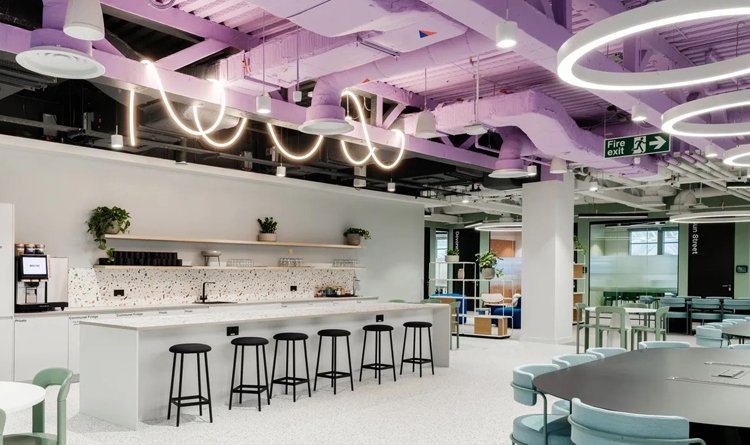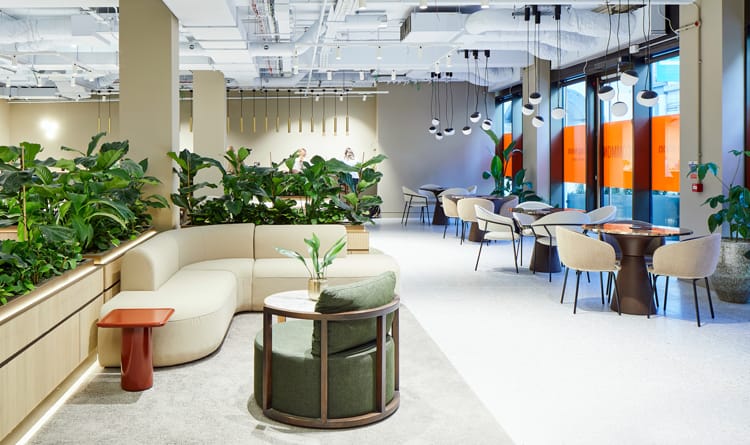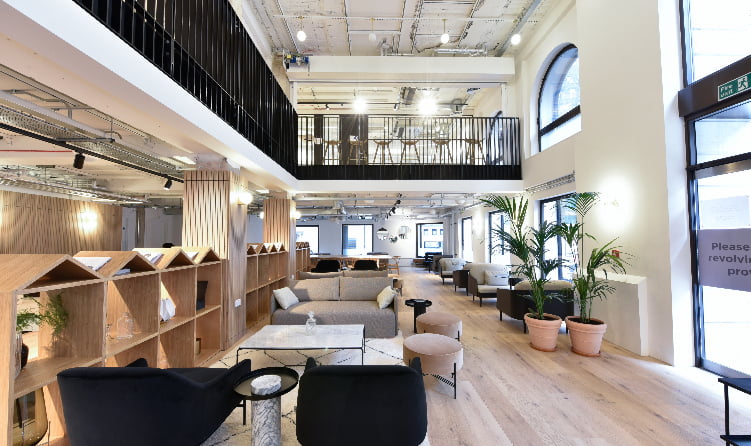
Flexible & Affordable Startup Office Space
Taking office space is a big step for any startup. It shows progress and intent, but it also entails fixed costs, legal commitments, and operational constraints that can affect the company’s future direction. In London’s flexible workspace market, the challenge isn’t finding options but choosing an agreement that adapts as your team size, funding, or work patterns change.
Startup Office Space in London: How to Choose Without Overcommitting
Many early-stage startups commit to hiring based on projected growth. A space that suits five people today may feel cramped six months from now. Committing too early to a larger office increases cash burn without improving performance. The key point to remember here is that it’s not the postcode; it is whether the office agreement can adapt to change as the company does.
A simple rule: get space for the size of the current team, plus room for one or two more employees. Review your headcount projections quarterly to determine whether you need more desks or space. Before signing, ask if the provider can adjust your agreement as you grow.
Here’s a basic checklist to help you decide:
• Current number of team members using the office weekly
• Expected hiring in the next 3-6 months
• Minimum term and notice period required by the provider
• Flexibility to add or remove desks
• Adequacy of meeting, break-out, and quiet space
This approach helps you avoid overcommitting and keeps your options open.

Why Central London Makes Commercial Sense
Areas around Liverpool Street, Moorgate, and the wider City remain attractive to fintech, technology, and financial services startups. Most office spaces in Central London benefit from excellent transport links, making client meetings easy to arrange.
Operational reliability, IT strength, and flexibility matter much more than exposed brick or coffee bars. For teams handling financial or regulated data, secure networks and privacy are essential. The office should support your work, not get in the way. Credibility is more than location.
Understanding Workspace Options
Startups typically choose between coworking, serviced offices, managed offices, or, occasionally, a traditional lease.
Coworking works for one to four people. Beyond that, noise, privacy, and brand consistency issues often arise.
Serviced offices are a practical choice for teams of three to thirty. They provide private offices in professionally managed buildings. Rent, business rates, utilities, internet, and cleaning are usually combined into a single monthly payment. Licence terms are often twelve months. The main question is flexibility: can you scale up or down, or leave, if your funding changes?
Managed offices are suitable for scaling teams that want more control over layout and branding. Commitments are usually one to three years, with deposits of one to three months’ rent. These spaces work best when staffing is predictable.
Traditional leases involve long commitments, significant deposits, and fit-out costs. Early-stage startups generally avoid them due to the risk and inflexibility.
Typical Costs and What They Mean
Private offices near Liverpool Street cost £500-£800 per desk per month. For a ten-person startup paying £600 per desk, the office makes up about 12% of total monthly expenses. That’s a big chunk of your annual revenue, so every desk needs to deliver real value.
Cutting an annual workspace cost of £70,000 by 8% saves £5,600. That could pay for a part-time developer, extend your runway by weeks, or boost marketing. Small savings can make a big difference.
Hidden Costs and Deposits
Serviced offices usually cover utilities, business rates, cleaning, reception, and shared meeting rooms. Deposits usually range from one to three months. Still, hidden costs can arise, such as extra meeting room hours, after-hours heating or cooling, IT upgrades, VLANs, extra Ethernet ports, licence changes, or furniture tweaks.
To avoid surprises, ask these key questions before signing:
• Are all meeting rooms included in the quoted price, and what are the charges for additional hours or usage?
• What services or amenities, such as IT upgrades or extra internet ports, incur extra fees?
• How much will it cost to make changes to the layout, adding furniture, or adjusting your agreement mid-term?
• What are the terms around deposit refunds, and under what conditions might they be withheld?
• Can you access a full breakdown of potential additional fees upfront?
These questions help founders manage risks and plan their budgets realistically.
Negotiation and Timing
Workspace prices aren’t usually fixed. You can often get discounts, rent-free months, or other incentives, especially on 12-month deals or when spaces need to be filled.
Your best leverage comes from comparing several options. Timing matters too. Quarter-end targets or slower demand periods can help you negotiate better deals.
Even small concessions on a £70,000+ annual spend can extend your runway, fund hires, or cover key services. When negotiating a serviced office deal, always request a break clause to allow you to exit early if needed. It’s also smart to request expansion rights to get priority for more space as you grow.
Make sure you understand the process and notice period for reducing desks during the term. Don’t hesitate to ask for rent-free months or fit-out help, especially if the provider has empty offices. Comparing several spaces and being clear about your needs helps you get better terms. Sorting these details upfront lets you plan smoother moves and avoid disruption if your team grows or shrinks.
Common Mistakes Startups Make
Hybrid and remote work patterns have changed how teams use the office. Before signing, track how many people actually use the space each week and consider whether everyone needs a permanent desk. Right-sizing your office for hybrid use can help avoid paying for empty seats and ensure your agreement aligns with actual usage, not just projections.
Frequent errors include:
• Committing to a space sized for the projected rather than the confirmed headcount
• Ignoring break clauses or licence flexibility
• Reviewing renewal terms too late
• Not testing IT capacity or data security.
Flexible workspace reduces risk compared to a traditional lease, but it doesn’t eliminate it.
Real-World Example
A funded tech team needed investor credibility and expected to hire quickly. They picked a serviced office with a short-term commitment and agreed on expansion rights. When hiring sped up, they expanded into the same building—the result: continuity, no move, and no extra legal costs.
A Measured Approach
Choosing startup office space in London isn’t about prestige or flashy savings. It’s about aligning costs, commitment, and infrastructure with your next growth stage.
At Office Broker, we help London SMEs who want clear advice, not marketing noise. We assess flexible workspaces based on their effectiveness, lease terms, and long-term flexibility before shortlisting. Our goal is simple: find space that still fits when your situation changes.
Frequently Asked Questions.
What is the best type of office space for startups in London?
Flexible serviced offices and coworking spaces are ideal due to short-term leases, all-inclusive pricing, and minimal setup costs.
How much does startup office space in London cost?
Costs vary by location and size. Hot desks start at £150/month, while private studios start around £500 – £900 per desk + VAT, depending on the building and location.
What is a startup office?
A workspace designed for early-stage companies, offering flexible terms, shared amenities, or private offices depending on the team’s needs.
When should a startup get an office?
Typically, once a team exceeds 3 to 5 people or regular client meetings require a professional environment.
How much does a startup office cost in London?
Startup office desks in London typically range from £200 to £700, depending on the location and type of office.
Which areas of London are best for startups?
Shoreditch, King’s Cross, and Soho are popular hubs for tech, creative, and media startups. Whilst Liverpool Street is close to financial institutions and venture capital firms, it has excellent transport links.
What's the difference between coworking and startup offices?
Coworking spaces are shared environments for early-stage startups. At the same time, private offices provide more privacy and room to grow; however, it’s worth noting that many coworking spaces are located in serviced office buildings that also offer private office space.
What lease length is typical for startups?
12-month flexible leases are common for funded teams that want to stay agile.
Do you provide legal advice?
No. We advise clients on commercial matters, but we recommend that clients obtain independent legal advice before signing any lease or license agreement.
How quickly can we move into a serviced office?
Sometimes you can move in within days, but we recommend allowing 4 to 6 weeks for a full market review and negotiation.
What is the difference between coworking and serviced offices?
Coworking gives you a shared, open-space membership, while serviced offices provide private, secure offices with all facilities included.






